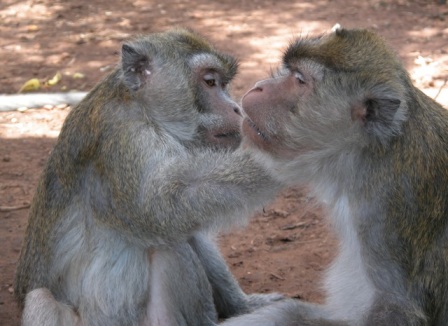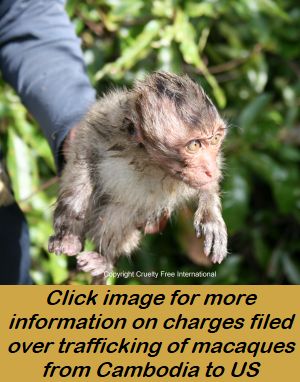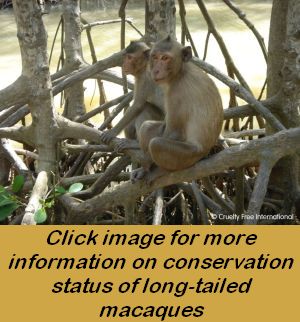Action for Primates

|
Action for Primates |

|
|
Free-ranging non-human primates are under increasing pressures from habitat destruction and fragmentation, agricultural expansion, human encroachment, hunting and the legal and illegal wildlife trade. One review has reported that Unsustainable human activities are now the major force driving non-human primate species to extinction
(Estrada et al 2017). The authors estimated that about 60% of non-human primate species are threatened with extinction and populations of 75% of non-human primate species are decreasing globally because of unsustainable human activities. Threats to non-human primates are widespread, and include 87% of species in Madagascar, 73% in Asia, 37% in mainland Africa and 36% in the Neotropics.
All non-human primates are listed under CITES (Convention on International Trade in Endangered Species of Wild Fauna and Flora); an international agreement between governments to regulate trade and prevent over-exploitation of wild animals and plants. Those non-human primates considered to be threatened with extinction, such as bonobos (Pan paniscus), chimpanzees (Pan troglodytes), gorillas (Gorilla gorilla), lemurs and orangutans (Pongo spp), are listed on CITES Appendix I. Trade in Appendix I species is only authorised under exceptional circumstances. All other non-human primate species are listed on CITES Appendix II, considered not to be threatened with extinction in the immediate future, but may become so if trade is not strictly regulated.
Every year, however, hundreds of thousands of non-human primates are forced into a widespread legal and illegal trade, both domestic and international, that causes immense animal suffering and continues to threaten their populations, as well as resulting in injuries and even death (ISP 2021). The global wildlife trade is the greatest threat to the survival of many endangered species. It is a trade responsible for destroying habitat and the lives of millions, including non-human primates, captured for laboratories or breeding facilities, sold as 'pets', as tourist 'attractions', abused and exploited for online 'entertainment' on social media platforms, and slaughtered for their bodies to be used as food (bushmeat), 'trophies' or medicinal products. The capture and removal of free-living non-human primates from their native habitats and social and family groups is, by its very nature, extremely cruel and inflicts great suffering and distress.
In terms of the international trade, in 2020, the top exporters of live non-human primates were Cambodia (43.6%), Mauritius (18.6%), France (9.13%), Singapore (5.79%), Spain (4.53%) and The Netherlands (4.28%) (OEC 2020). The top importers of live non-human primates were United States (47.5%), Canada (11.2%), Spain (9.94%), Germany (5.82%), France (9.24%) and United Kingdom (4.56%).

By far, the largest trade in non-human primates has and continues to be that for the global research and toxicity testing industry. Historically, this was a trade in wild non-human primates that saw millions of animals, including rhesus (Macaca mulatta) and long-tailed macaques (Macaca fascicularis), baboons (Papio spp), squirrel monkeys (Saimiri sciureus) and various species of vervet monkeys (Chlorocebus spp), captured in Asia, Africa, the Caribbean and South America and exported largely to the USA and Europe. There followed a reduction in the numbers of wild-caught non-human primates used in laboratories, following widespread pressure by animal protection organisations and the introduction of government export and import bans and restrictions. The most notable export ban was implemented by India in 1978, which, at the time, was exporting tens of thousands of wild-caught rhesus macaques to the US for research every year. The ban followed a global campaign by the International Primate Protection League (McGreal 2015). An import ban on the use of wild-caught non-human primates and their offspring in research was adopted by the European Union (EU 2010) and was expected to be implemented in 2022.
This reduction in demand for wild-caught non-human primates was, however, offset by a rapid increase in large-scale breeding farms for macaques in countries such as Cambodia, China, Laos, Mauritius and Vietnam. The long-tailed macaque, also exported from Indonesia and the Philippines, is now the most widely traded and the most heavily used non-human primate species for research and toxicity (poisoning) testing. Tens of thousands of these monkeys are held in concrete pens in large industrial-scale facilities, with no foliage and little enrichment. There have been and continue to be concerns regarding the legitimacy and status of captive-breeding claims (SSN 2012).

In November 2022, the US Department of Justice filed smuggling and conspiracy to violate the Lacey Act and the Endangered Species Act charges against officials from the Cambodian Ministry of Agriculture, Forestry and Fisheries, and the owner and several staff from a major macaque supplier in Cambodia. These charges, filed following an investigation by the US authorities into the global trafficking of long-tailed macaques into the US for research and toxicity testing, allege wild-caught macaques were falsely stated to be captive bred at Cambodian facilities (including Vanny Bio Research (Cambodia) Corporation Ltd) for export to the US and elsewhere, and provided with false CITES export permits (DOJ 2022).
There has, however, been a revival in the capture and export of wild long-tailed macaques from Indonesia and Mauritius. Action for Primates released footage depicting the brutal capture of macaques in Indonesia, with monkeys trapped inside large nets, forcibly removed and shoved into sacks or crammed into wooden crates. On capture, infants were separated from their mothers and unwanted alpha males were beaten and their throats cut with a machete (more information).
Global assessments by the International Union for Conservation of Nature's (IUCN) Red List have repeatedly listed the status of the long-tailed macaque as Endangered with a decreasing population trend, the latest in October of 2024 (Hansen et al 2025). A lack of population data for the species across its range and available evidence that shows populations are decreasing in various parts of its range have raised serious concerns about the conservation status of the long-tailed macaque, and the impacts that an increasing demand will have on that status.
trade in live primates, both legal and illegal, is a major threat to nonhuman primate conservation ... the capture of nonhuman primates from the wild is stressful for the animals and increases the suffering, risk of injuries, spread of disease and even death during capture, storage and transport
![]()
![]()
![]()
![]()
![]()
Contact us via E-mail
Copyright © 2020-2026 Action for Primates. All rights reserved.